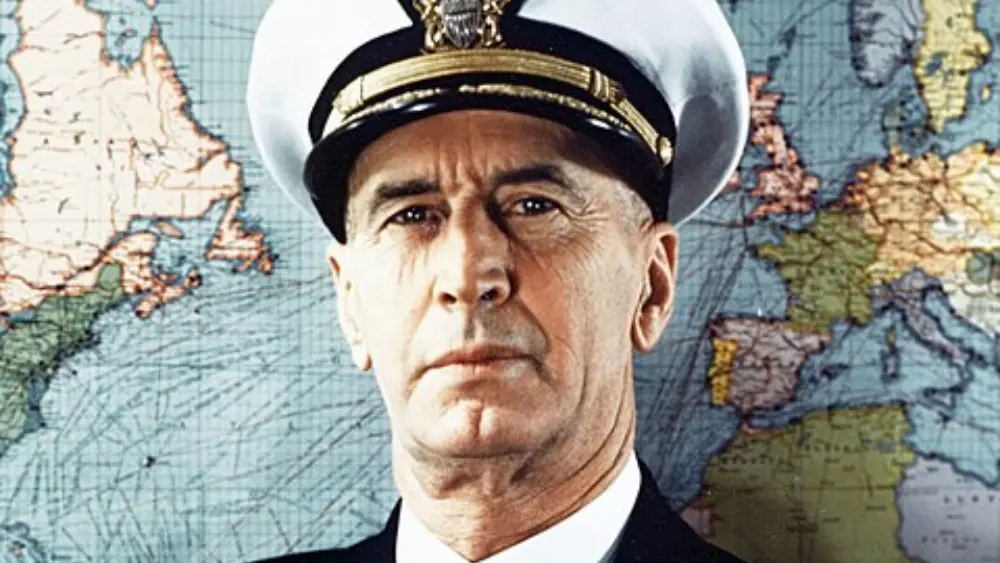Joseph Ernest King, born on November 23, 1878, in Lorain, Ohio, emerged as one of the most influential naval leaders in American history. His distinguished career culminated during World War II, where he served as both Chief of Naval Operations (CNO) and Commander in Chief of the United States Fleet (COMINCH). His unwavering resolve, strategic brilliance, and dedication to naval innovation were critical to the Allied victory and transformed the U.S. Navy into a formidable global force. King’s story is one of perseverance, vision, and leadership that reshaped naval warfare in the 20th century.
Early Life and Naval Career
Ernest King’s life was inexorably linked to the sea, a passion that had its roots in his formative years. He commenced his journey towards a distinguished naval career by enrolling at the United States Naval Academy, where he honed his maritime knowledge and leadership skills. Graduating in 1901, King embarked on a naval career that would span decades and become synonymous with excellence in naval strategy and operations.
King’s early naval service was characterized by assignments on a variety of ships and postings across the globe. These experiences not only provided him with a comprehensive understanding of naval operations but also instilled in him the practical wisdom necessary to navigate the complexities of naval strategy. His early years in the Navy played a crucial role in developing his leadership and strategic skills, laying the foundation for a career that would leave a lasting mark on naval history.
Early Naval Career and World War I Service
World War I marked a significant chapter in Ernest King’s naval career. During this global conflict, King assumed the role of an aide to the Commander in Chief of the Atlantic Fleet. This position provided him with a unique opportunity to gain firsthand experience in the intricacies of naval warfare and logistics. Serving in such a capacity allowed Ernest King to witness the challenges and complexities of coordinating naval operations on a grand scale, preparing him for the leadership roles that would follow in his illustrious career.
King’s service during World War I enhanced his practical understanding of naval strategy. He gained firsthand experience in managing complex naval operations. This period also deepened his commitment to the defense of the nation. The lessons he learned laid the groundwork for his future leadership roles. Later, he would play a pivotal role in shaping U.S. naval operations during World War II. Ernest King’s contributions during World War I foreshadowed the remarkable leadership he would provide in the years ahead.
The Interwar Years: Innovation and Advocacy for Naval Aviation
The period between World War I and World War II was marked by rapid changes in military technology and global geopolitics. For Ernest King, the interwar years were a time of professional growth and strategic foresight. As he climbed the ranks, King became an outspoken advocate for modernization, particularly in naval aviation.
Recognizing early the transformative potential of aircraft carriers and air power at sea, King pushed for greater investment in carrier-based aviation. This was a controversial stance at a time when battleships still dominated naval doctrine. King’s vision was that air power would become a decisive factor in naval engagements, capable of projecting force far beyond the horizon and disrupting enemy fleets before traditional surface combat could begin.
In addition to aviation, Ernest King supported advancements in radar, sonar, and communications technology. He understood that winning future conflicts required technological superiority and integrated naval capabilities. His leadership during these years helped lay the groundwork for the Navy’s rapid expansion and innovation that would prove vital in World War II.
Rise to Chief of Naval Operations and Leadership in World War II
Ernest King’s appointment as Chief of Naval Operations in 1939 came at a critical juncture. Europe was already engulfed in war, and tensions in the Pacific were escalating. The United States Navy needed strong leadership to prepare for the possibility of global conflict. Ernest King assumed the position with the dual role of also being Commander in Chief of the U.S. Fleet, a rare consolidation of authority that underscored the confidence placed in his leadership.
The attack on Pearl Harbor on December 7, 1941, thrust the U.S. into World War II, and King’s leadership was immediately tested. Faced with a sudden and devastating blow, King’s response was decisive and aggressive. He pushed for rapid naval expansion, mobilization of shipyards, and accelerated training programs to rebuild the fleet’s strength and take the fight to the Axis powers.
King’s leadership style was known for its intensity and directness. He demanded high standards from his officers and personnel, but he was also respected for his deep knowledge of naval operations and his ability to make tough decisions. He worked closely with President Franklin D. Roosevelt and other military leaders, playing a pivotal role in shaping the U.S. war strategy.
Strategic Vision: The “Germany First” Policy and Aggressive Naval Warfare
One of Ernest King’s most enduring contributions to the Allied war effort was his advocacy for the “Germany First” strategy. King understood that Nazi Germany’s military machine posed the most immediate threat to the United States and its allies. Japan’s attack on Pearl Harbor was catastrophic. However, Ernest King argued that defeating Germany should take precedence to avoid facing a two-front war on an even larger scale.
This strategic decision was controversial but ultimately critical to Allied success. King’s insistence on prioritizing resources for the European theater ensured that the United States, Britain, and their allies could concentrate on defeating the Nazi regime. Only after the European Axis powers were subdued did the Allies turn their full might against Japan.
King approached naval warfare with marked aggressiveness beyond strategic prioritization. He believed that the best defense was a strong offense. Under his leadership, the U.S. Navy embraced innovative tactics such as carrier-based air strikes, amphibious assaults, and submarine warfare. These strategies crippled Japanese shipping, severed supply lines, and hastened the collapse of Axis naval power.
Coordination and Collaboration with Allied Forces
King’s role extended beyond U.S. Navy operations. As a senior member of the Combined Chiefs of Staff (CCS), he worked closely with British and other Allied commanders to coordinate naval operations on a global scale. The Allies relied on this cooperation to manage the war’s complexity and scope effectively.
King’s relationship with British naval leaders like Admirals Dudley Pound and Andrew Cunningham was vital in creating joint strategies for the Atlantic and Mediterranean theaters. The CCS provided a forum for balancing national interests, resolving operational disputes, and synchronizing the deployment of naval forces.
Furthermore, this collaboration ensured the effective management of the Battle of the Atlantic, where Allied convoys faced relentless attacks from German U-boats. The coordinated use of escort ships, air patrols, and intelligence-sharing under King’s guidance helped secure vital supply lines that were the lifeblood of the Allied war effort.
Post-War Service and Demobilization
Following the conclusion of World War II, Ernest King continued to serve as Chief of Naval Operations until 1945. During this period, one of his primary responsibilities was overseeing the complex and massive demobilization of the U.S. Navy, which involved the reduction of the Navy’s wartime personnel and resources to peacetime levels. This task was no less challenging than the wartime operations he had overseen, as it required careful planning and management to ensure a smooth transition to a peacetime footing.
Although Ernest King retired from active duty in December 1945, his impact on national defense policy discussions remained enduring. King’s deep knowledge of naval strategy and operations, along with his strategic thinking, made him a respected voice in post-war defense planning. He continued to influence and shape U.S. defense policy long after his active service ended. Ernest King extended his legacy well beyond his military career by contributing significantly to the development of post-war defense strategies. Military leaders and historians alike continue to celebrate and study his contributions to the Navy and national defense.

Ernest King’s Enduring Legacy
Ernest King’s legacy is multifaceted. He stands out as a naval visionary who recognizes the evolving nature of warfare and actively champions technological innovation. His leadership transformed the U.S. Navy from a relatively modest force into a dominant global power.
King committed to naval aviation and helped establish aircraft carriers as the centerpiece of naval strategy. This concept continues to define naval power projection today. He insisted on aggressive, proactive engagement, which changed the mindset of naval commanders. His approach helped secure victory in two critical theaters of World War II.
Moreover, Ernest King’s dedication to international cooperation set a precedent for post-war alliances such as NATO, which continue to rely on integrated multinational military strategies. Historians often debate aspects of King’s leadership style, noting his sometimes blunt and demanding manner. However, few dispute his profound impact on American naval history. His ability to navigate the political, technological, and operational challenges of the largest naval conflict in history cements his place as one of the great military leaders of the 20th century.
Ernest King’s journey from a young naval cadet in Ohio to the highest echelons of military command is a testament to his enduring dedication and strategic acumen. His leadership during World War II, especially as Chief of Naval Operations and Commander in Chief of the U.S. Fleet, was pivotal to the Allied victory. King’s forward-thinking embrace of technology, his bold strategic vision, and his relentless pursuit of excellence reshaped the U.S. Navy and secured his legacy as one of America’s greatest naval commanders.
Ernest King inspires military professionals and historians alike. His story reminds us that leadership, innovation, and collaboration drive success during times of great challenge and change. He firmly established his place in history not only as a war hero but also as the architect of American naval power in the modern era. King transformed the U.S. Navy into a dominant global force through his vision and determination. His lasting impact on the Navy and the nation’s defense capabilities continues to influence military strategy today. As a true giant in American military history, King’s legacy guides future generations of leaders.











